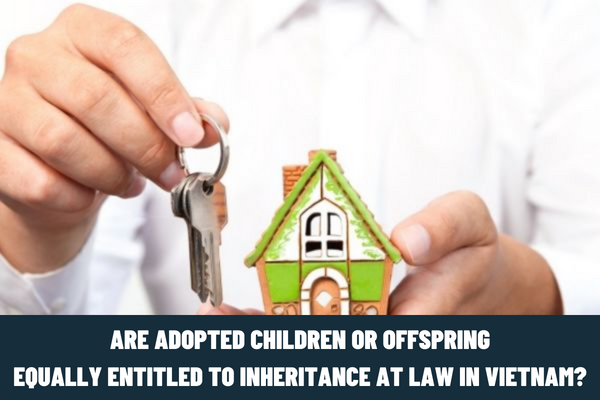Are adopted children or offspring equally entitled to inheritance at law? What are the cases of inheritance at law in Vietnam?
Are adopted children or offspring equally entitled to inheritance at law in Vietnam?
Article 651 of the 2015 Civil Code of Vietnam provides for heirs at law as follows:
Heirs at law
1. Heirs at law are categorized in the following order of priority:
a) The first level of heirs comprises: spouses, biological parents, adoptive parents, offspring and adopted children of the deceased;
b) The second level of heirs comprises: grandparents and siblings of the deceased; and biological grandchildren of the deceased;
c) The third level of heirs comprises: biological great-grandparents of the deceased, biological uncles and aunts of the deceased and biological nephews and nieces of the deceased.
2. Heirs at the same level shall be entitled to equal shares of the estate.
3. Heirs at a lower level shall be entitled to inherit where there are no heirs at a higher level because such heirs have died, or because they are not entitled to inherit, have been deprived of the right to inherit or have disclaimed the right to inherit.
Thus, according to the above provisions, adopted children and offspring are in the same first level of heirs, so when dividing inheritance according to law, adopted children and offspring will inherit equally.

Are adopted children or offspring equally entitled to inheritance at law? What are the cases of inheritance at law in Vietnam? (Image from the Internet)
What are the cases of inheritance at law in Vietnam?
Article 650 of the 2015 Civil Code of Vietnam provides for the cases of inheritance at law as follows:
Cases of inheritance at law
1. Inheritance at law shall apply in the following cases:
a) There is no will;
b) The will is unlawful;
c) All heirs under the will died prior to or at the same time as the testator dying, or the bodies or organizations which are entitled to inherit under the will no longer exist at the time of commencement of the inheritance;
d) The persons appointed as heirs under the will do not have the right to inherit or disclaimed the right to inherit.
2. Inheritance at law shall also apply to the following parts of an estate:
a) Parts of an estate in respect of which no disposition has been made in the will;
b) Parts of an estate related to an ineffective part of the will;
c) Parts of an estate related to heirs under the will not having the right to inherit, having disclaimed the right to inherit, or having died prior to or at the same time as the testator dying; and parts of an estate related to bodies or organizations entitled to inherit under the will but no longer existing at the time of commencement of the inheritance.
Thus, inheritance at law shall apply in the following cases:
- There is no will;
- The will is unlawful;
- All heirs under the will died prior to or at the same time as the testator dying, or the bodies or organizations which are entitled to inherit under the will no longer exist at the time of commencement of the inheritance;
- The persons appointed as heirs under the will do not have the right to inherit or disclaimed the right to inherit.
- Parts of an estate in respect of which no disposition has been made in the will;
- Parts of an estate related to an ineffective part of the will;
- Parts of an estate related to heirs under the will not having the right to inherit, having disclaimed the right to inherit, or having died prior to or at the same time as the testator dying; and parts of an estate related to bodies or organizations entitled to inherit under the will but no longer existing at the time of commencement of the inheritance.
Order of priority of payment when dividing inheritance?
The order of priority of payment when dividing inheritance according to the provisions of Article 658 of the 2015 Civil Code of Vietnam is as follows:
Order of priority of payment
Property obligations and expenses related to an inheritance shall be paid in the following order of priority:
1. Reasonable funeral expenses in accordance with customary practice;
2. Outstanding support payments;
3. Expenditures on preservation of estate;
4. Allowances for dependants of the deceased;
5. Wages;
6. Monetary compensation for any damage;
7. Taxes and other liabilities owed to the State;
8. Other liabilities owed to other natural persons or juridical persons;
9. Fines;
10. Other expenses.
Thus, property obligations and expenses related to an inheritance shall be paid in the following order of priority:
- Reasonable funeral expenses in accordance with customary practice;
- Outstanding support payments;
- Expenditures on preservation of estate;
- Allowances for dependants of the deceased;
- Wages;
- Monetary compensation for any damage;
- Taxes and other liabilities owed to the State;
- Other liabilities owed to other natural persons or juridical persons;
- Fines;
- Other expenses.
LawNet
